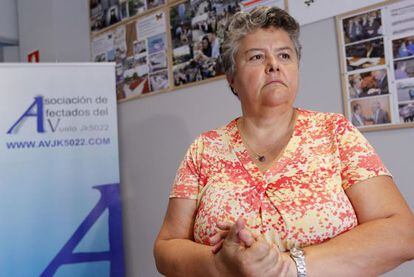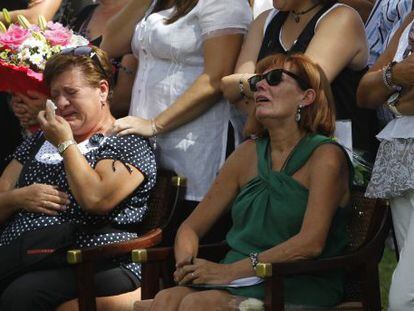President of Spanair crash victims group says investigation should be reopened
"The investigation was closed with just two people charged, when it should have been five"

Pilar Vera, the president of the Association of Victims of Flight JK 5022, lost a niece in the Spanair disaster at Madrid's Barajas airport. Since then she has not rested in four years, spurred on by two beliefs: that someone must be held to account for the accident, and that if a similar catastrophe should occur, the authorities should be compelled to offer "dignified treatment" to victims and their families alike.
Vera cannot forget the "appalling treatment and psychological strain" that those affected by the crash on August 20, 2008 had to go through after chaos and improvisation took hold of the airport. Aside from the ongoing legal battle, Vera is determined to see the introduction of a victims' statute containing a specific protocol that should be followed in the event of an air disaster. "We already have a statutory agreement with the justice minister, Alberto Ruiz-Gallardón," Vera notes.
By contrast, the association president, who attended a memorial ceremony for victims at Barajas on Monday, is extremely unsatisfied with the judicial proceeding. "The investigation was closed with just two people charged, when it should have been five at least. The judge closed the case because he knew that the General Council of the Judiciary wasn't going to make the same effort it did after the accident; the trial was collapsing and he decided to shut it down and didn't carry out some investigations we had asked for. We have appealed."
The flight was delayed by an hour in the August heat, and the passengers had pressured the captain to get airborne
Vera also believes the judge erred in dissecting expert testimony: "In his report on the case closure, the judge gives prevalence to the expert report by Ciaiac
[the Civil Aviation Accident Investigation Commission], which is not an independent body." She points out the lack of "independence" of Ciaiac, which is part of the Public Works Ministry and "does not even have expert pilots on its staff."
Vera adds that this lack of independence lies behind Ciaiac "laying the blame in its report solely on the pilots forgetting to activate the flats and slats, the flight crew being distracted by a cabin crew member in the cockpit, and the passengers."
"Black holes"
The Ciaiac stated in its report that, as the flight was delayed by an hour in the August heat, the passengers had pressured the captain to get airborne. Vera is very unhappy about the document. "In just a week we collected 55,000 signatures and we have presented them to the European Parliament to force Spain to alter the report. Furthermore, there is an audit that reveals 40 black holes in Spanish civil aviation."
Vera also complains that the judge was not more vigorous in pursuing Boeing, which built the aircraft. "Despite the requirements, Boeing has declined to inform the judge about the tests it was asked to carry out." She believes she knows the reason for Boeing's recalcitrance. The American company has 1,200 MD-80 aircraft - the type that crashed in Madrid, as well as in Detroit in 1987, killing 156 people - in service across the globe. All feature the same TOWS alarm system that failed on both occasions. If the TOWS fails, there is no back-up system to alert pilots to any faults.
Vera says Ciaiac tried to cover up the existence of the cabin crew member, an electrical engineer who died in the accident, for a long time. As can be heard in the black box recording, this engineer said he thought it was insanity that the ground crew had lowered the temperature of the RAT system with a pack of ice and had disabled or isolated the Z29 relay, which delivers fluid to both the TOWS and RAT, which measures the external temperature of the aircraft.
"In disabling the relay to lower the temperature of the RAT, they disabled the alarm," says Vera. "The technicians, instead of isolating it, should have changed it for another, then they would have maintained the supply to the TOWS."











































